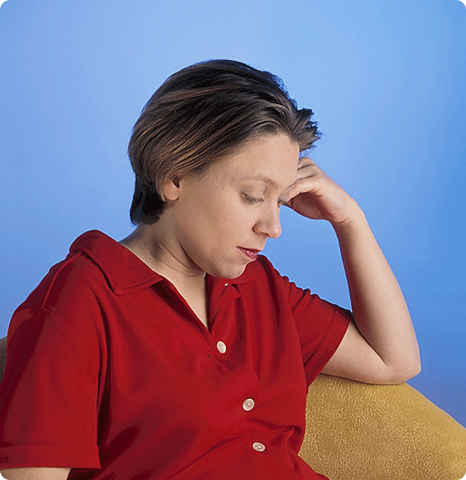Postnatal Depression
When we imagine what life will be like with our new baby, we might focus upon the joy that the baby will bring and anticipate a new level of relationship with our partner. We know that we are probably going to be tired and that there will be a lot of additional work.
Feelings of sadness or depression can come as a shock after having a baby. We generally don't imagine that this will be part of the experience of becoming a parent. However, this can be the experience of 15-20% of new mothers and 5% of fathers.
Postnatal Depression
Post-natal depression can appear suddenly or gradually, and women’s experiences of it vary greatly but in general terms post-natal depression includes feeling of depression, anxiety, sadness and difficultly coping which occur in the first year of a baby’s life and persist for more than 2 weeks.
Symptoms
You may not recognise the symptoms of Postnatal Depression in yourself and it is generally partners who spot that something is wrong. The things to look out for are very similar to the signs of general depression and include:
- complaining about numerous physical symptoms;
- anxiety about the health of a thriving baby;
- insomnia or sleeping for long period;
- feeling well in the morning, but deteriorating as the day goes on;
- generally feeling unable to cope with the needs of the baby and of others;
- feelings of failure, of being a ‘bad’ parent.
Causes
There is no single cause of Postnatal Depression. There is good evidence that it can be triggered by the profound hormonal changes which occur after the birth, but it tends to be more complex than this. Postnatal Depression can occur as a reaction to the stresses of life with a new baby including the baby’s birth, lack of sleep or support with caring for the baby, feeling isolated or loss of personal freedom. Previous experiences of depression and low self-esteem can contribute as well as past experiences of abuse or difficulties in relationships with a partner or own mother.
Looking after yourself
So what can you do to reduce the possibility of these experiences being part of your first year with your baby?
A key step to take is to ensure that you have support in place for the first three months with your new baby. The needs of new babies are many, and thousands of years ago, they were met by family and friends of the parents as well as parents themselves. The advent of the nuclear family has given rise to a different socially constructed experience of new parenthood, where two or sometimes just one person is responsible for meeting the baby’s needs as well as taking on the workload of the house keeping.
During pregnancy, you might consider putting arrangements in place for emotional as well as practical support. Involving family members and close friends in caring for you in the early weeks, will mean that you are better able to care for your baby, get enough rest and eat well.
If you have had experiences of depression in the past or have experienced Postnatal Depression in a previous pregnancy you will be at greater risk. Planning ahead will included making connections with agencies and professionals who can help you through this experience should it occur again.
It is important to look after one another during this time. Watch for signs of Postnatal Depression in your partner and encourage them to get help in the early stages if necessary.
Where to Get Help
-
Maternal and Child Health Service – parents of young children are expected to visit their maternal and child health nurse regularly for ages and stages check ups.
-
Your GP – PND is an illness and talking to your doctor will enable you to get a diagnosis for what you are experiencing. Your GP will then be able to work with you to help you recover.
- Post and Ante-natal Depression Association Ph: 1800 130 026
- Beyond Blue Ph: 1300 22 46 36
- Parent Helplines by State
| States | Service | Phone number | Hours of operation | ||
| ACT | Parentline | (02) 6287 3822 | 9 am to 9 pm (Mon-Fri, except public holidays) | ||
| Health Direct Australia | 1800 022 222 | 24 hours, 7 days | |||
| NSW | Parentline | 1300 130 052 | 24 hours, 7 days | ||
| Karitane Care Line |
1300 227 464 (02) 9794 1852 (Sydney metro) |
24 hours (Mon - Thurs) 9 am - 9 pm (Fri - Sun) |
|||
| Tresillian Parent Helpline |
1800 637 357 (02) 9787 0855 (Sydney metro) |
24 hours, 7 days | |||
| NT | Parentline | 1300 301 300 | 8 am - 10 pm, 7 days | ||
| QLD | Parentline | 1300 301 300 | 8 am - 10 pm, 7 days | ||
| 13 Health | 13 43 25 84 | 24 hours, 7 days | |||
| SA | Parent Helpline | 1300 364 100 | 7:15 am - 9:15 pm, 7 days | ||
| TAS | Parenting Line Tas | 1300 808 178 | 24 hours, 7 days | ||
| VIC | Parentline | 132 289 | 8 am - 12 am, 7 days | ||
| Maternal and Child Health Advisory Line | 132 229 | 24 hours, 7 days | |||
| WA | Parenting Line |
1800 654 432 (STD callers) (08) 6279 1200 |
24 hours, 7 days | ||
| Grandare (information service for grandparents) |
(08) 6279 1200 |
10 am - 3 pm (Mon - Fri) | |||
| Ngala Helpline | (08) 9368 9368 | 8 am - 8 pm 7 days |

